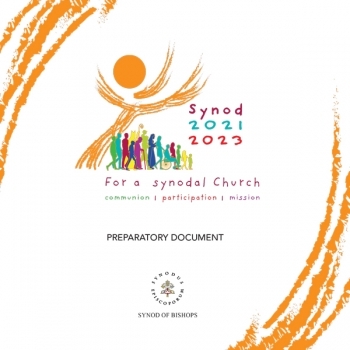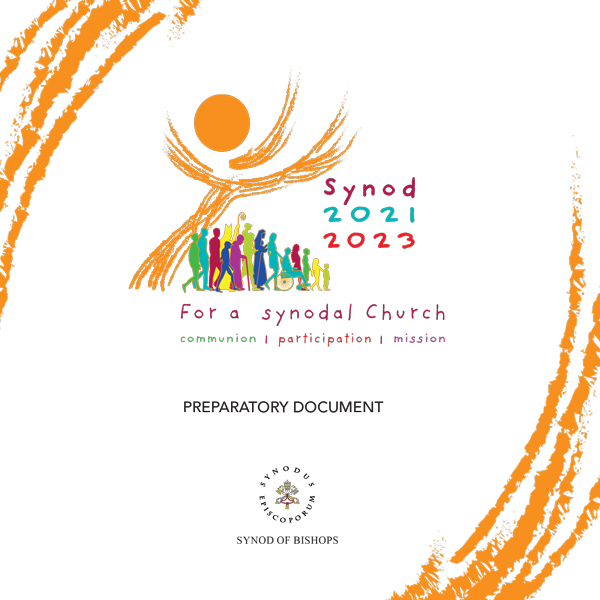
.png) Bp Gerald John Mathias
Bp Gerald John Mathias

Pope Francis has convoked a Synod on Synodality with the theme “For a Synodal Church: Communion, Participation and Mission”.
This is the XVI Ordinary Synod of Bishops. There have been also some Extraordinary and Special Synods. The Popes from St. Paul VI to the present Pontiff have convoked Synods to discuss some important issues in the life and mission of the Church. It is a way the Church lives and demonstrates collegiality. The Pope does not take important decisions on his own but consults the Bishops of the world and also some experts on a particular subject of importance.
Synods are usually held in Rome in the month of October but prior to the actual synod participated by elected Bishops representing their conferences and a few nominated by the Pope and some experts chosen as observers and advisors, consultations are held in local Churches to share their views on the chosen subject.
But the present Synod is unique in that the Consultations or the Synod itself will take place in 3 phases, Diocesan/national, continental, and universal over a two-year period from October 2021 to October 2023. Datelines and Preparatory Document are already given to Bishops.
The Holy Father Pope Francis will inaugurate the Synod in Rome on 9-10 October 2021 and all the local Bishops will solemnly inaugurate the Synod in their own dioceses on 17th October 2021. In the first phase, dioceses and Bishops Conferences will hold the Synods from October 2021 to April 2022 and April 2022 to September 2022. The second phase will be at the continental level (for us FABC) from September 2022 to March 2023. The final phase, the universal phase, will take place in Rome in October 2023.
The Preparatory Document prepared by the General Secretariat of the Synod of Bishops and approved by the Pope highlights the purpose of the Synod: “The purpose of the Synod, and therefore of this consultation, is not to produce documents, but ‘to plant dreams, draw forth prophesies and visions, allow hope to flourish, inspire trust, bind up wounds, weave together relationships, awaken a dawn of hope, learn from one another and create a bright resourcefulness that will enlighten minds, warm hearts, give strength to our hands.’” (No. 32) A lofty ideal indeed!
After every Synod the fruits of the Synod are presented to the Holy Father and he, adding his own reflections, gives a Post-synodal Apostolic Exhortation to the Church and/or to humanity. In the present Synod, especially the first two phases, the focus or concern is not to produce a document but to give an experience to all people of God, pastors and lay faithful, of journeying together, to think, reflect, discern and decide together as people of God.
Pope Francis distinctly wants the laity to be more active in the synodal process. It should not be a clerical or hierarchical exercise but of the whole people of God. The Preparatory Document underscores “the fundamental importance of the voice of the poor and excluded also finds a place, not only that of those who have some role or responsibility within the particular Churches” (No.31). Therefore, views from the pews are important and are not to be ignored.
Apart from a Preparatory Document, a Vademecum – Handbook for Listening and Discernment in local Churches -- is also sent by Synod Secretariat to all local Churches to help in the discussions and discernment process.
The Synod is a call to journey together. Pope Francis had said on the occasion of the 50th Anniversary of the Institution of Synod of Bishops on 17 October 2015: “It is precisely this path of Synodality which God expects of the Church of the third millennium.”
In fact, the Church by its nature is synodal. Church and Synod are synonymous. The early Church lived the synodal way. However, over the centuries certain clericalism crept in and the role of the laity receded to the background and they were made only to pray, pay and obey.
This Synod is a call to shun clericalism: “The whole Church is called to deal with the weight of a culture imbued with clericalism that she inherits from her history, and with those forms of exercising authority on which the different types of abuse (power, economic, conscience, sexual) are grafted” (Preparatory Document No.6).
The International Theological Commission, in its document, Synodality in the Life and Mission of the Church (2 March 2018), clarifies that Synodality is much more than the celebration of ecclesial meetings and Bishops’ assemblies, or a matter of simple internal administration within the Church. It is rather “the specific modus vivendi et operandi of the Church, the People of God, which reveals and gives substance to her being as communion when all her members journey together, gather in assembly and take an active part in her evangelizing mission”. (No. 6)
Theoretically, the Church, whether local or universal, does have Synodality or Synodal way as the modus vivendi et operandi. However, in practice we see a different reality. For instance, the Church’s law provides for various forms of consultation e.g., Diocesan College of Consultors, Priests Council or Senate, Diocesan Pastoral Council, Parish Pastoral Council, Diocesan and Parish Finance Committees etc. There are many Associations or Sodalities in most of the dioceses e.g., Laity Associations, Men’s and Women’s Sodalities, Legion of Mary, Vincent De Paul Society, Mahila Mandals, Youth Associations etc., not to mention Conferences and Synods of Bishops, Conference of Religious at the national level.
However, while some of these mandatory and/or voluntary bodies function well in some places, in many other places they exist nominally, or sadly in some places, many of them are non-existent or non-functional or defunct.
The Synodal process due to take place in various phases will give us a renewed opportunity to revive some defunct bodies or start afresh new associations especially to empower and involve lay participation in the Church.
Many attempts are made and opportunities provided to our lay faithful to empower them and get them actively involved in not only implementing but also making decisions. But much more needs to be done in this regard. However, it must also be said that only a small number of laity is active while the vast majority is either indifferent or silent spectators.
Diocesan Synod will be a wake-up call to all those dioceses where the canonical bodies are not functioning as they ought to be. Consultations should take place at parish, deanery, diocese, region and national levels during the first phase of the Synod. Much can be achieved if we activate all the existing canonical bodies and have regular meetings and consultations.
This whole exercise, if taken seriously, and in the right spirit, will provide an experience of Communion, Participation and Mission to the People of God. However, it should take place in an environment of prayer and docility to the promptings of the Holy Spirit. As the Vademecum reminds us: “Synods are an ecclesial exercise in discernment: Discernment based on the conviction that God is at work in the world and we are called to listen to what the Spirit suggests to us” (Vademecum 2.3).
Unfortunately, given the pandemic situation which still continues, large gatherings will be difficult. But many consultations, listening and discussions can take place in small groups, already mentioned above, thus giving opportunities to more people to participate rather than only selected few members at the diocesan level.
Small Christian Communities (SCCs) as a new way of being Church fosters and promotes active participation in the Church. Strengthened by the Word of God in Gospel Sharing and nourished by the Eucharist, the Small Christian Communities are active in the Church’s evangelizing mission. It is supposed to be a pastoral priority in India. However, it is actively promoted only in some parishes of some dioceses. There is hesitancy on the part of many parishes to encourage and promote Small Christian Communities. Time has come now and the Synod process and journeying together should encourage us to move forward towards the formation of Small Human Communities (SHCs) as well.
The Synodal process should also help us in India, where we live in a pluralistic society with many cultures, religions, languages, rites, denominations etc. to create and promote a culture of peace and harmony. Inter-religious and ecumenical dialogue will gain more importance particularly in a polarized society. We must truly be salt of the earth and light of the world. We must be the leaven or catalyst to make our country a better place to live.
As it is there exists a good and cordial relationship among the clergy, religious and lay faithful in most of the dioceses, barring a few individuals or small groups. The Synod process will help to strengthen this relationship to collaborate and work together for the common mission of the Church.
One of the serious drawbacks in India, perhaps also true of many other countries, is that many of the Magisterial teachings, be they Papal addresses, Apostolic Exhortations or Encyclicals, do not percolate down to the common people. Most of our laity, and sometimes even priests and religious are ignorant of the Magisterial documents and their teachings. Pulpits and other fora are seldom used to communicate the teachings of the Church, including the recent Magisterium. The forthcoming synodal process, it is hoped, will create a new interest among people to learn and a sense of obligation on the part of the pastors to feed the flock with the magisterial teachings along with the Word of God and the Eucharist.
What I envisage, as well as what is expected from us, as mentioned already, is not any well drafted, theologically profound document emerging from the Synodal process in any of our dioceses or Bishops’ Conferences in India, but an experience of listening to each other, participating in discussions, reflecting and discerning together by pastors and faithful, owning up shortcomings and defects in our pastoral programmes as well as administration. This will give us all a sense of satisfaction that we are “journeying together” to build a communion through participation to carry out our common mission. What we experience during this phase of the synod must become our modus vivendi et operandi in future.
We can leave the drafting of the final document to the Synod Secretariate and the Pope. Surely, we will submit the fruits of our diocesan synods to the Central Co-ordinating Team. But the very fact that we are participating in the synodal process should give all of us, pastors and faithful, a growing awareness that we all belong to the Church, that we journey together and are one in continuing the mission of Christ.
I share the hope expressed in the Vademecum that “the experience of the Synodal Process will bring about a new springtime for listening, discernment, dialogue, and decision-making, so that the whole People of God can be then journeying together with one another and the entire human family, under the guidance of the Holy Spirit” (Vademecum 3.5). Let that be the modus vivendi et operandi of the Church in India during and after the Synod on Synodality.
(The writer is the Bishop of Lucknow)